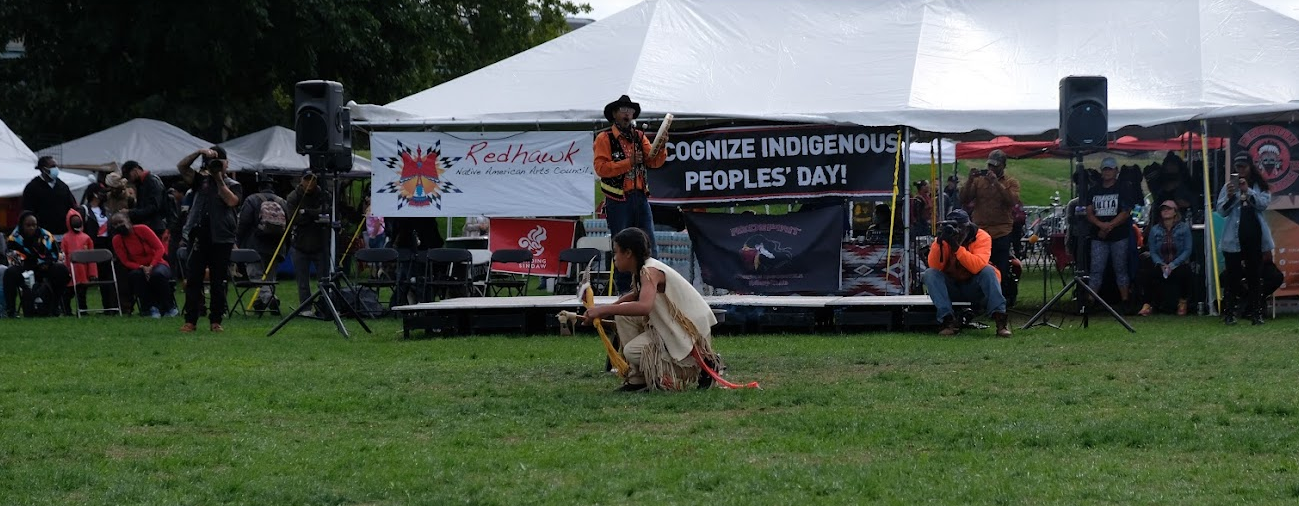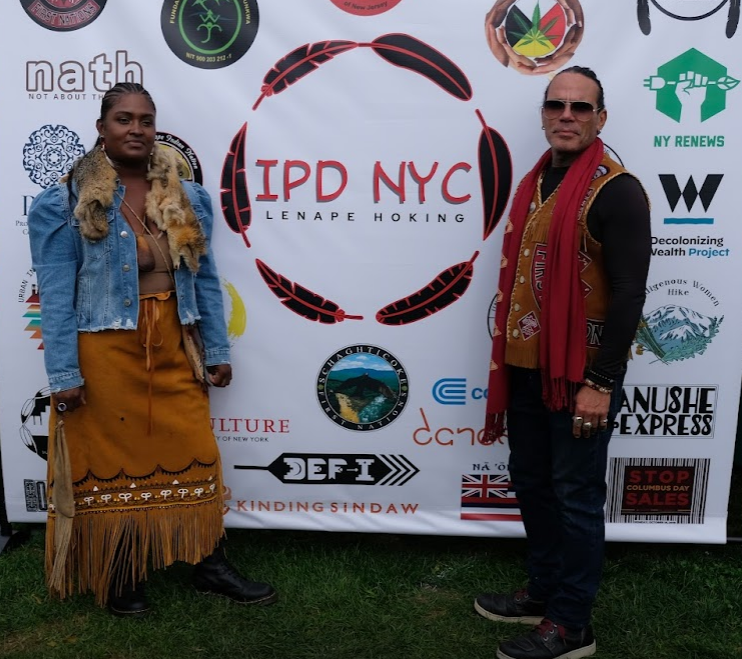
- Details
- By Jenna Kunze
RANDALLS ISLAND, New York—The word “recognize” doesn’t exist in the Shinnecock Nation language, according to tribal member Chenae Bullock. She is one of the organizers of the seventh annual New York City Indigenous Peoples’ Day celebration on Randalls Island, a small island located in the East River, between Manhattan, the Bronx, and Queens.
“It is important to recognize, but for us, it’s more so to acknowledge our existence,” Bullock, donning her traditional regalia, told Native News Online over the sound of a drum performance. “Because not acknowledging our existence actually continues the perpetuation of genocide to our people who are still living.”
Want more Native News? Get the free daily newsletter today.
New York City does not recognize Oct. 11 as Indigenous Peoples’ Day, despite being home to the largest population of Native Americans in the country, according to 2020 census data. Instead, it pays tribute to the lost Italian who paved the way for European colonization, and thus Native American desecration. New York State Gov. Kathy Hochul yesterday signed the state of New York’s first ever proclamation recognizing Indigenous Peoples’ Day, after first attending the city’s 77th annual Columbus Day parade.
One of the founders of Monday’s celebration, Cliff Matias, Taíno & Kichwa, said that celebrating both holidays contradict one another.
“I think this ideology of trying to maintain Columbus Day and yet honor Indigenous Peoples’ Day (is) without the understanding that Indigenous Peoples’ Day was created as an answer to Columbus Day,” Matias said. “We would never have selected this particular day. To honor Indigenous people we selected this day to say ‘‘We have survived that dude. We have survived the ideology that has been set forth from his being lost in the Caribbean. Our traditions and cultures are still here, and we can still assemble and share that with... the rest of the world.’ That's really what today is about for us.”
More than 150 tribal nations decorated Randalls Island Park with bright colors, flags, banners, and more from all over the world in celebration of the unofficial Indigenous Peoples’ Day. Visitors gathered in a large talking circle, and listened to guest speakers and musical performances. Large teepees flanked the circle, and the outside perimeter of the field was made up of vendors selling crafts from their respective tribal nations.
Each speaker acknowledged the Lenape land they stood on.
Immortal Technique, also known as Felipe Andres Coronel, a local acclaimed hip hop artist of Peruvian roots known for his political messaging, performed two pieces of spoken poetry on the history of colonialism in the Americas. “We are the Indigenous people and we are just separated by a different European language from our Indigenous brothers and sisters up here,” he said.
Executive director of the Navajo Nation’s Washington D.C. office, Santee Lewis, spoke about the importance of embracing self-determination “not as survivors, but as thrivers.”

She told the crowd that the $4.8 million home Navajo Nation purchased this year across the street from the House of Representatives’ building is slated to be the Nation’s embassy. “I challenge other Indian Nations to do the same, because we need you,” Lewis said. “When we do that, we stop seeing ourselves as conquered and remember the strength, ingenuity, and creativity of those that came before us and that moves in us.”
Overall, Bullock and Matias said they’ll keep advocating for city and state-wide recognition until they join the other cities and states that have abandoned Columbus Day in favor of Indigenous Peoples’ Day, including South Dakota, New Mexico, and Oregon.
Last week, the city of Boston joined the list of other cities such as Berkeley, Seattle and Minneapolis that have also replaced Columbus Day with Indigenous Peoples’ Day.
Matias said it’s shameful that New York City—whose Mayor Bill de Blasio, who is of Italian-American descent on his mother’s side, has repeatedly protected the city’s statue of Christopher Columbus located in Columbus Circle in Manhattan —is so far behind.
“This is New York City, home to the United Nations (and) the cultural capital of the world,” Matias said. “The world looks to New York City to see what it's doing. New York City has to abolish Columbus Day. They're not going to appease us by playing politics and celebrating Indigenous Peoples’ Day and Columbus Day. The Italian-American community should really find an Italian American hero.”
More Stories Like This
Native News Weekly (August 25, 2024): D.C. BriefsNavajo Nation Mourns the Passing of Former Vice President Rex Lee Jim
Deb Haaland Earns Endorsement From Communications Workers of America Local 7076
University Soccer Standout Leads by Example
Two Native Americans Named to Democratic Congressional Campaign Committee's“Red to Blue” Program
Help us defend tribal sovereignty.
At Native News Online, our mission is rooted in telling the stories that strengthen sovereignty and uplift Indigenous voices — not just at year’s end, but every single day.
Because of your generosity last year, we were able to keep our reporters on the ground in tribal communities, at national gatherings and in the halls of Congress — covering the issues that matter most to Indian Country: sovereignty, culture, education, health and economic opportunity.
That support sustained us through a tough year in 2025. Now, as we look to the year ahead, we need your help right now to ensure warrior journalism remains strong — reporting that defends tribal sovereignty, amplifies Native truth, and holds power accountable.
 The stakes couldn't be higher. Your support keeps Native voices heard, Native stories told and Native sovereignty defended.
The stakes couldn't be higher. Your support keeps Native voices heard, Native stories told and Native sovereignty defended.
Stand with Warrior Journalism today.
Levi Rickert (Potawatomi), Editor & Publisher

